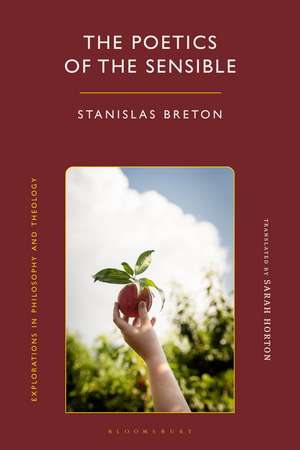The Poetics of the Sensible: Explorations in Philosophy and Theology
Autor Stanislas Breton Traducere de Sarah Hortonen Limba Engleză Hardback – 7 feb 2024
Preț: 509.02 lei
Preț vechi: 730.39 lei
-30% Nou
Puncte Express: 764
Preț estimativ în valută:
97.41€ • 101.08$ • 81.42£
97.41€ • 101.08$ • 81.42£
Carte tipărită la comandă
Livrare economică 17-31 martie
Preluare comenzi: 021 569.72.76
Specificații
ISBN-13: 9781350386853
ISBN-10: 1350386855
Pagini: 176
Dimensiuni: 156 x 234 mm
Greutate: 0.43 kg
Editura: Bloomsbury Publishing
Colecția Bloomsbury Academic
Seria Explorations in Philosophy and Theology
Locul publicării:London, United Kingdom
ISBN-10: 1350386855
Pagini: 176
Dimensiuni: 156 x 234 mm
Greutate: 0.43 kg
Editura: Bloomsbury Publishing
Colecția Bloomsbury Academic
Seria Explorations in Philosophy and Theology
Locul publicării:London, United Kingdom
Caracteristici
The first English language translation of the classic late 20th-century text within French Catholic thought
Notă biografică
Stanislas Breton was a French theologian and philosopher. He taught at the École Normale Supérieure in Paris, the Catholic University of Paris and the Catholic University of Lyon, France.Sarah Horton is pursuing research in philosophy at the Catholic University of Paris and the Australian Catholic University
Cuprins
Preface by Jean GreischTranslator's NoteIntroduction1. Sensible, Sense, Sensibility2. The Meta Function3. Mask and Metastasis4. The Angel's Wing: The Feast of the Ascension and of Metaphor5. The Metamorphoses of Fire6. Tastes, Fragrances, Colors7. The Abode8. Figure, Image, IconNotes BibliographyIndex
Recenzii
You hold in your hands a sparkling masterpiece by a legendary master of Continental thought remarkably well-rendered into English. As soon as you catch your breath, wonder strikes yet again as you journey through the poetics of the sensible with Stanislas Breton as your guide.
Breton's Neoplatonic and Scholastic background enables him to go beyond phenomenology in exploring the ontological and cosmological significance of the senses. The style of this contemplative essay, enriched by imaginative reading of Scripture, conveys the warmth and benevolence of one who always used both heart and head in his plucky "respondens dico" to the questions of the hour. He ends by inviting our senses to perceive traces of divine presence in icons, cathedrals, Kyoto gardens, and in the faces of a sufferer and of a child.
Breton's Neoplatonic and Scholastic background enables him to go beyond phenomenology in exploring the ontological and cosmological significance of the senses. The style of this contemplative essay, enriched by imaginative reading of Scripture, conveys the warmth and benevolence of one who always used both heart and head in his plucky "respondens dico" to the questions of the hour. He ends by inviting our senses to perceive traces of divine presence in icons, cathedrals, Kyoto gardens, and in the faces of a sufferer and of a child.



